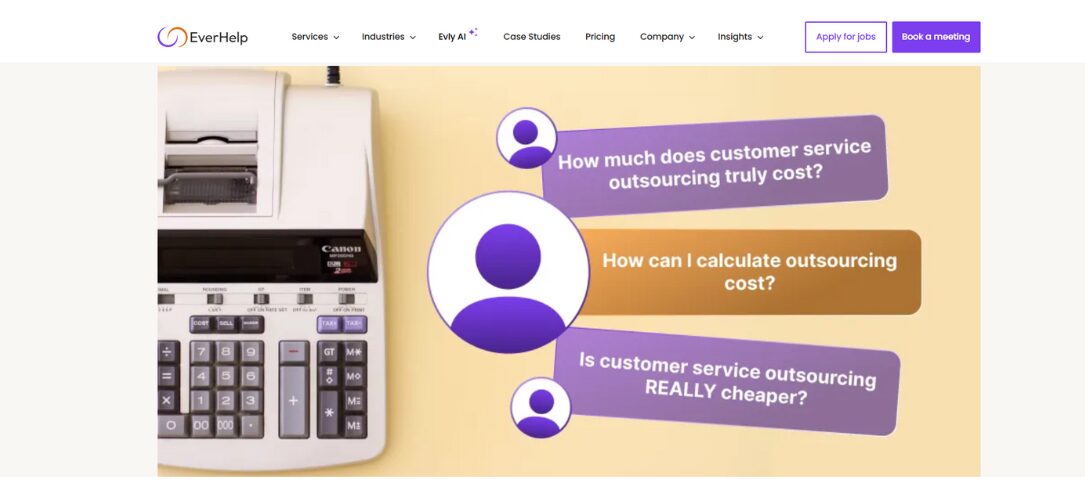Startups live and die by their ability to move fast, delight customers, and scale smarter than the competition. Yet too often, running regular operations, such as customer support, turns into a time-consuming and energy-draining hurdle. Long response times, stretched teams, and frustrated users can stall momentum before a startup even finds its stride.
That’s why outsourcing support, previously often viewed as simply a hack to cut costs, is now transforming into a more usual practice intended to drive business growth.
The Shift in Perception: Outsourcing Is NOT Just for Cost-Cutting
Outsourcing has come a long way from being merely a cost-saving tactic to becoming a strategic partnership model that fuels innovation, scalability, and sustainable growth.
Today, many specific tasks are best handled by external experts, especially when the demand is temporary or highly specialized. Trying to hire every expert in-house proved both costly and impractical. Factoring in the customer service outsourcing cost, it often becomes clear that delegating these functions gives companies a far better return, freeing up valuable time and resources while allowing internal teams to focus on refining their business models and driving core initiatives.
As such, after trying this model out, many leaders have noticed that time and money aren’t the only benefits they gain. Businesses, particularly growing ones, have discovered that outsourcing allows them to easily scale operations without compromising quality. By partnering with the right external providers, companies can flexibly expand their processes, bringing in specialized talent and adapting to changing demands precisely when it’s needed.
Delegating tasks has always been a smart business practice. After all, that’s why we have managers, team leads, and HR partners. Outsourcing works on the same principle: it allows your business to hand off whichever complex or time-consuming operations to experienced teams. These experts can handle the work faster and more efficiently than if you tried to do everything in-house, freeing your team to focus on what they do best. As such, this gives you more than just a bigger budget. It presents an opportunity to develop your growth strategy and further expand the business.
Why Support is Critical to Startup Growth
Now, let’s turn to the matter of customer service. Firstly, why do startups even need support to grow? Is it THAT helpful, really?
Fortunately or not, the answer is yes, yes, it is. In our world, online (and offline, of course) reputation matters. Even if you are the best at what you do or offer a unique solution, low CSAT levels can hold you back from truly succeeding. However, this is not the only reason why startup customer service is an important factor for business growth.
Modern customers go for experiences, and not only the products. And your support team’s responsiveness is a part of that experience. If a customer reaches out and waits hours (or, let’s face it, even as much as 10 minutes) for a reply, their frustration builds, and you risk losing a sale. Surveys show, that 73% of clients will likely switch to competitors after a couple of bad experiences, and over one-half will do it after just one.
Unsurprisingly, over time, poor support like that contributes to customer churn (as even dedicated users may leave, if your business isn’t helpful), generates negative reviews, and leaves opportunities on the table that your competitors will gladly seize.
On the other hand, if you have a strong customer support system, your brand, though fresh and green, can gain a lot of needed recognition and build up a solid customer base. Everything points to the fact that prompt, knowledgeable, and thoughtful interactions turn one-time buyers into loyal fans. When customers feel heard and valued, they share their positive experiences with others, and, what’s arguably even more important, keep coming back.
And that’s why customer support is a genuine growth factor: it builds trust, attracts users, and fuels referrals that sustainably scale your business. Essentially, this is all a young venture needs to carve out a niche in a competitive market.
Outsourced Support as a Startup Growth Strategy
It’s time for a second question: how does support outsourcing power startup growth? Let’s break it down.
1) Easy scalability.
You never know when your startup will take off. One day, you might wake up to 40K incoming tickets with your team struggling to keep up. Another month, the volume might drop to just 5K. That unpredictability is exactly why outsourcing support makes sense. Unlike an in-house team, an outsourced partner can scale up or down as needed, helping you stay efficient while saving budget during slower periods.
2) Global reach.
As your startup grows, entering new markets often means offering multilingual support, 24/7 availability, and omnichannel service. Building this in-house can be complicated, but outsourcing takes that operational headache off your shoulders. An experienced support outsourcing partner will easily and quickly source agents with the right language skills and schedules. They will also be able to create a unified system across multiple communication channels. In short, they will only facilitate your global expansion and provide seamless customer support.
3) Focus on core business.
When most of your routine and time-consuming processes are taken care of, your core team will finally be able to dedicate time to key responsibilities. Building further your business strategy, planning partnerships and collaborations, optimizing budgets, or simply looking into how you can make the existing product even better.
4) Data insights.
One of the most underrated benefits of outsourcing for startups is access to expert data analytics. Every new business needs reliable insights to understand where and how to improve. Back in 2023, Gartner report showed that around 79% strategists admitted that in the following 2 years, using analytics and AI would be critical to their business success. Now, in 2025, the situation hasn’t changed. Luckily, outsourcing offers companies a chance to get access to such expert knowledge.
For instance, one of the customer support outsourcing providers, EverHelp, provides AI-powered data analytics as part of their outsourcing package. They collect customer feedback, track and spot support trends, and report the most common issues customers face when interacting with your brand. With this information, your core team can focus on solving problems, refining the customer experience, and advancing your product.
Major Signs It’s Time for a Startup to Outsource
If you are still wondering whether to outsource your customer service, don’t worry. Of course, such a decision shouldn’t be taken lightly. Below you will find a few red flags to look out for — if you notice them in your business, it’s time for you to start looking for that outsourcing solution.
Rising ticket volumes, overwhelming the in-house team.
When your startup starts growing, more customer inquiries will follow. First, your small in-house team might manage just fine. But with rising tickets, they will become progressively more overwhelmed, which will lead to a growing backlog. If your team spends more time battling support requests than focusing on their core roles, that’s a clear signal that it’s time to bring in reinforcements through outsourcing.
Slower response times or missed SLAs.
If you start noticing response times increasing and your team missing service-level agreements (SLAs), this means your reputation is at risk. Customers may forget a longer reply, but they won’t forget (and won’t stay quiet) if your agents don’t provide a quality service and aren’t helpful. Opting for support outsourcing will give you access to a dedicated team that will keep up with demand, making sure customers always feel heard and valued.
Expensive to recruit and train in-house staff.
For startups, a budget can sometimes be used as a guiding star. When a good chunk of your costs is spent on recruitment and training of new employees, look into outsourcing options. Hiring and onboarding take time and money, and these are the two things you can’t always afford to waste. So why not just delegate it to a provider that will cover everything from sourcing to training and just provide you with professional agents, ready to step in immediately to work.
Plans to expand into new markets or time zones.
As was previously mentioned, growth often means reaching into new markets. This, in turn, will require your business to have extra support features, such as 24/7, multilingual, and omnichannel assistance. If that’s exactly your case, then outsourcing should be your number one priority. This way, you will gain a partner who can provide all of those features for you, and organize operations so that even during the first launch, your customers won’t notice anything.
Conclusion
It’s a popular misconception that only large corporations or popular companies can benefit from an outsourced customer support team. The reality is, even if you are a small startup, you can win a lot just by giving the reins of your customer service to a third-party provider.
Instead of stretching your team thin with endless tickets, you’ll have experts handling your customers with speed and care, while you stay focused on building your product and shaping your growth strategy. Outsourcing will not mean you give something up. On the contrary, you will gain flexibility, resilience, and the ability to scale without burning out your people. And that just might be the competitive edge you were looking for.





























